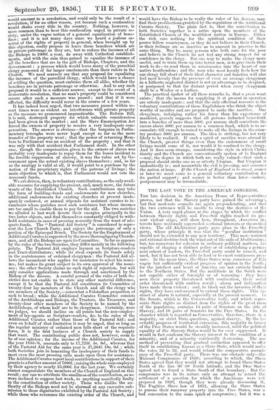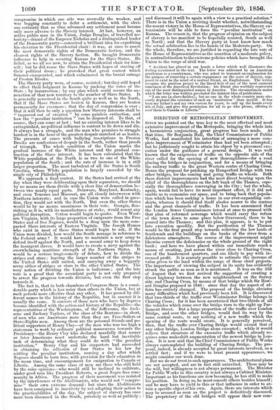THE LAST VOTE IN THE AMERICAN CONGRESS.
THE late decision in the American House of Representatives proves, not that the Slavery party have gained the advantage, but that moderate councils are again preponderating, and that the two extremes will be unable to sway the destinies of the Union. A very rapid glance at the stages by which the conflict between Slavery rights and Free-Soil rights reached its pre- sent violent stage, will show how, throughout, American in- terests have uniformly superseded sectional interests or theoretical views. The old Abolitionist party gave place to the Free-Soil party, whose principle it was that the " peculiar institution " should not be extended to any new territory. This more national and rational doctrine took the wind out of the sails of Abolitionism ; but, too numerous for cohesion in ordinary political matters, in- capable of shaping a distinct policy or of establishing a perma- nent cohort of leaders, the Free-Soil party could be roused, and used, but it has not been able to lead or to exert continuous pres- sure. In the mean time, the Slave States were conscious of this vague but sufficiently evident progress of opinion in the North ; for the intellect and heart of America are not entirely limited to the Northern States. But the multitude in the South were not capable either of foresight or of reasoning : they have /leen their property threatened with confiscation, their social order threatened with sudden revolt ; alarm and indignation have made them violent ; and, to block out the invasion of their rights, they have endeavoured to extend those rights. This in- stinct of alarm is natural, especially at the present moment. In the Senate, which is the Conservative body, and which repre- sents State rights as distinct from the rights of the great mass of the population, contains 15 pairs of Senators on the side of Slavery, and 16 pairs of Senators for the Free States. In the chamber which is regarded as Conservative, therefore, there is a majority, on strict State questions, against slavery. By the in- evitable progress of territorial extension, this majority in favour of the Free States would be steadily increased, until the political equality of the Slavery States would be for ever suppressed. It would in fact condemn the Slavery interest to the condition of a minority, and of a minority continually decreasing. The one method of preventing that gradual extinction appeared to offer itself in establishing Kansas as a Slave State, which would make the votes 32 to 32, and would retard the comparative ascend- ancy of the Free-Soil party. There was one obstacle only—the Missouri Compromise of 1820 ; according to which, the Slave States agreed that they would not attempt to found Slave States North of the line 36' 30' North latitude, and the Free States agreed not to found a State South of that boundary. But the compromise was in its nature only an attempt to retard the settlement of a question for which the Americans were not prepared in 1820, though they were already discussing it. The Fugitive Slave law of 1851, allowing the Slave States topursue their runaway property into the Free States, was a bad.• concession to the same spirit of compromise ; but it was a
compromise in which one side was avowedly the weaker, and was begging constantly to defer a settlement, with the obvi- ous certainty that as time advanced any settlement must become only more adverse to the Slavery interest. At last, however, an active public man in the Union, Judge Douglas, of travelled no- toriety—friend of the Emperor Nicholas and a distinguished leader of the Democratic party—conceived a brilliant idea for expediting his elevation to the Presidential chair : it was, at once to assert the most democratic rights of the Democratic faction, and the clearest rights of the Slavery faction. He brought Democratic influence to help in securing Kansas for the Slave States. He failed, as we all see now, to attain the Presidential chair for him- self ; but he did rouse the Slave States with hopes of staving off their political doom ; he provoked that great contest which Sumner exasperated, and which culminated in the brutal outrage of Preston Brooks.
The Slavery party were, of course, resisted ; but they still hoped to effect their lodgment in Kansas by packing the votes of the State ; by insurrection ; by any plan which could secure the an- nexation of that new territory to the number of Slave States. It is generally perceived in the South quite as well as in the North, that if the Slave States are beaten in Kansas, they are beaten permanently for evermore ; that the day of compromise is over ; that it will then be only a question how Slavery interests shall be " improved out of creation " by some painless extinction, and how the " peculiar institution " can be disposed of. To that, of course, they can come at last ; but no existing interest likes to be extinguished, no political influence is content to lie down and die. It always has a struggle, and the man who promises to struggle hardest is in the hour of the greatest despair snatched at as leader. The presents of canes with bullying inscriptions to Preston Brooks are confessions of despair in the South, rather than proofs of triumph. The whole condition of the Union marks the gradual increase of the White interest and the gradual con- traction of the Slave interest. It has been calculated that the White population of the North is as two to one of the White population of the South ; and the rate of increase is in a still larger proportion. The most turbulent of all the States is South Carolina, whose White population is largely exceeded by the single city of Philadelphia.
We approach a final contest. If the States had arrived at the day when they were deliberating upon their separation, we should by no means see them divide with a clear line of demarcation be- tween two nearly equal parts. Delaware, Maryland, Kentucky, and even Tenessee and Missouri, are all closely interwoven with Northern interests ; and in case the Union were called in ques- tion, they would act with the North. But even the other States would be by no means unanimous in their vote. Georgia, flou- rishing as it is, with its manufactures at stake, would resent any political disruption. Cotton would begin to quake. Even West- ern Virginia, with its large proportion of emigrants from the Free States and of free Negroes, would be a drag upon the more com- pacted Slave interests of Eastern Virginia. The Joseph Humes who exist in most of these States would begin to ask, if the Union were divided, how would the South manage in reference to the Federal army ? It would have to maintain a new army to defend itself against the North, and a second army to keep down the insurgent slaves. It would have to create a navy against the overwhelming maritime strength of the Northern States. It would be a serious tragi-comedy of debate, how to divide the stripes and stars ; leaving the larger number of the stripes to the United States still united, and carrying away a beggarly array either of stripes or stars to the other United States. The very notion of dividing the Union is ludicrous ; and the late vote is a proof that the ascendant party is not only prepared to arrest the progress towards division, but even the first step towards it.
The fact is, that in both chambers of Congress there is a consi- derable party which is less noisy than others in the Union, but at such periods more effective than any other. It has passed by dif- ferent names in the history of the Republic, but in essence it is usually the same. It consists of those men who have by degrees become identified with the action and history of the Republic-the representatives of the Washingtons, of the Jeffersons, the Jack- sons and Zachary Taylors, of the class of the Bentons--in short, of men who are Americans more than they are Free-Soilers or State-Rights men. Among them are the personal friends and po- litical supporters of Henry Clay—of the man who was too high a statesman to work by ordinary political manoeuvres towards the Presidency—the Henry Clay who declared manfully that sooner or later Americans must undertake the hard but inevitable task of determining what they could do with "the peculiar institution." Henry Clay and his supporters had succeeded in obtaining the adhesion of four States to his law for settling the peculiar institution, naming a day after which Negroes should be born free, with provision for their education in the mean time, and encouragement for emigration to Canada or Liberia. .Among the same class of men are those who still hold by the same opinions—who would still be inclined to cultivate, under good men like President Roberts, a great Negro free com- munity in Africa. The progress of their movement was resisted by the interference of the Abolitionists, who would not " compro- mise " their own extreme demand : but since the Abolitionists have been consigned to inactivity by not adapting their action to the practicabilities of the day, the subject of slavery has once more been discussed in the South, privately as well as publicly ; and discussed it will be again with a view to a practical solution.* There is in the Union a reviving doubt whether, notwithstanding the recent victory in the House of Representatives, the Slavery ex- tensionists will be able to force the "peculiar institution" on Kansas. The reason is, that the progress of opinion on the subject of slavery is too manifest to be hopefully resisted, South as well as North ; and that the Slavery party at least know how much the actual arbitration lies in the hands of the Moderate party. On the whole, therefore, we are justified in regarding the late vote of the House of Representatives as the assertion of a moderate policy, in contradistinction to the extreme policies which have brought the Union to the verge of civil war.
* Accident has placed in our hands a letter which well illustrates the feeling mentioned in the text. The letter was addressed by an American gentleman to a countryman, who was asked to transmit an explanation for the purpose. of removing a certain repugnance on the score of slavery, sup. posed to exist in the mind of a mutual friend, an Englishman. The writer occupies the position proper to the lineal heir of one of the most eminent statesmen of the American Revolution ; his friend also worthily represents one of the most distinguished names in America. The circumstances under which the letter was writtenprecluded the faintest idea of publication. " I am one [a slave-holder] ; but no one in the whole country more sin- cerely deplores the existence of such an institution' than myself. It has been my father's and my own custom for years, to call up the hands every 4th of July, and give free permission for all to go who please, offering to send them to Canada or Liberia." .-



























 Previous page
Previous page